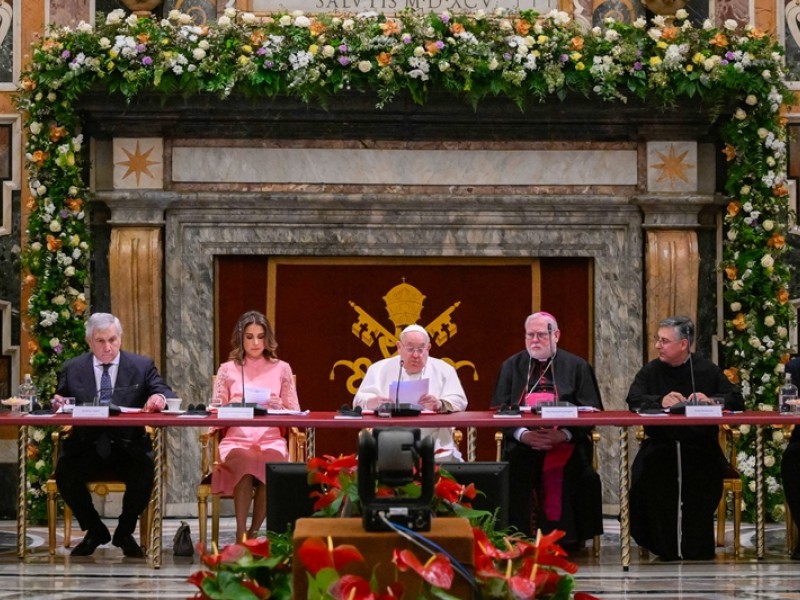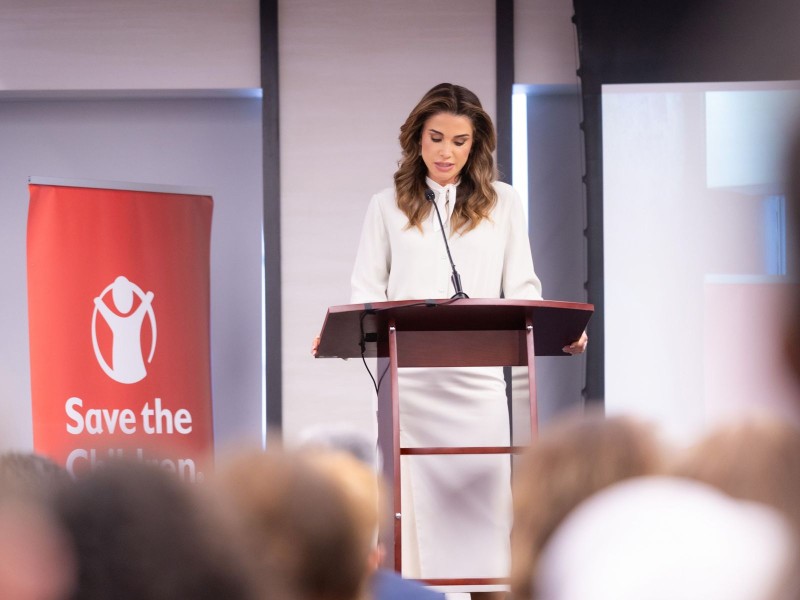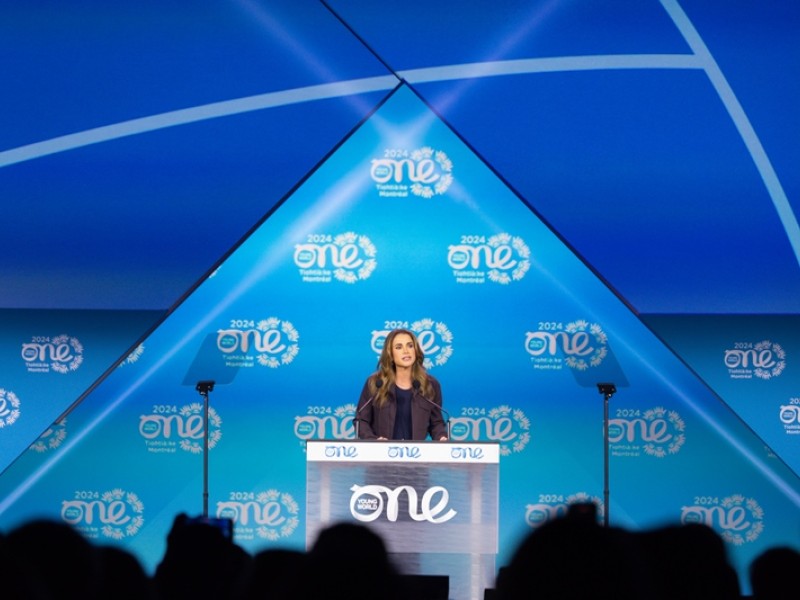Queen Rania’s Speech at the Fifth Edition of the Paris Peace Forum - Paris, France
Bonjour.
It’s an honor to join you at this Paris Peace Forum.
I suspect that even if this is your first time in Paris, you had no trouble getting here this morning.
The modern technology we carry in our pockets has made it almost impossible to get lost.
We could be in any city in any country in the world and know exactly where to go.
But we’re gathered today because it often feels our world itself has lost its way.
Everywhere we turn, we’re confronted with complex crises that demand collective action.
Yet, too often, we are failing to meet our common threats with a spirit of common cause.
Perhaps we shouldn’t be surprised.
When COVID made it risky to breathe the same air, it was literally hard to stand together.
The war in Ukraine has sent shockwaves across the geopolitical terrain.
Inequality is driving disillusionment and enabling extreme voices to break through.
The forces of outrage and misinformation are crowding out compassion and common sense.
Too often, so-called “facts” are no longer self-evident… or connected to evidence at all.
We’ve seen an alarming erosion of public trust. Trust in government. Trust in media. Trust in each other.
So the theme of our gathering has it right: We are facing a convergence of crises.
But I want to challenge us all to aim higher than just “riding out” the storm.
Our world is off-balance. Simply trying to keep things steady is not enough.
We should treat this moment like the shake-up it is. It’s time for a paradigm shift...
And that will take four critical realignments:
Renewing our faith in truth...
Recognizing that we all have equal worth…
Safeguarding the future…
And believing in our ability to remake the world as we wish it could be. As we know that it can be.
Let’s start with the truth.
We must tell it like it is... and act on what we say.
Honesty is the foundation of trust, but words are not enough. Cynicism flourishes in the gap between words and deeds.
Take, for example, the climate crisis… and the chasm between promises and policies.
We have shown we can set ambitious goals. But what’s the point if we don’t follow through?
Seven years ago, right here in Paris, world leaders pledged collective action to limit greenhouse emissions and prevent global temperatures from rising.
And yet, as the UN Secretary General declared last month, we are “falling pitifully short” of those commitments. Earlier this week, President Macron warned that “the climate emergency is here.” The most recent UN climate report estimates that temperatures will rise a full degree past safe conditions… and that we have “no credible path” to meeting our stated goals.
What is our excuse for further delay?
Is it selfishness? Denial? An expectation that if we wait, someone else will fix it for us?
The planet is burning and melting and flooding before our eyes.
It’s too late for wish lists. We need binding to-do lists… to save both our credibility and our planet.
With so much at stake, I am reminded of something Victor Hugo once said: “great perils have this beauty, that they bring to light the fraternity of strangers.”
Which brings me to the second piece of our paradigm shift: We must honor our common humanity.
We all live in the same world. Self-sufficiency is an illusion. None of us can truly thrive unless we all do.
Yet, during dark times, there can be an impulse to only look out for our own.
To say of others, “if they are not like us, then we do not like them.”
But until we embrace the reality of our connectedness, we’ll continue to bear the worst of its consequences.
Consider for example the global refugee crisis, which has reached epic proportions. More than 100 million people are displaced around the world – one-and-a-half times the population of France.
We all know it is hard to balance domestic needs with global cries for help. But the international community has more capacity than is sometimes claimed.
Take the world’s response toward the more than 7.6 million refugees who have fled Ukraine since February. Like everyone, I’ve been deeply moved by the images from Europe and everywhere else, as host countries welcomed exhausted, frightened families to their new homes.
And yet, how different the response has been toward refugees from places like Syria, Myanmar, and South Sudan. Those people, too, had been driven from their homes. They too were afraid for their lives. What accounts for the contrast in compassion? Does skin color make all the difference?
Too often, the barrier isn’t budgets. It’s bigotry and bias.
With such a flawed moral compass, it is no wonder our world feels as though it has lost its way. And as long as our response to challenge is raising walls instead of will, we will be condemned to strife and suffering without end.
So, our paradigm shift must include recognition that all of us have equal worth…
But it’s not enough to recognize the humanity of people living in faraway places, we must equally value those who will live in an entirely different moment in time.
And that leads to part three of the paradigm shift: We have to act in the service of future generations.
Because what we do today is about tomorrow, too. Our choices will affect people we will never meet, but who matter as much as we do.
We see a glimpse of their faces in our children and grandchildren.
Last year, in a global survey of 10,000 young adults, more than half think the things they value most will be destroyed. Forty percent said they’d hesitate to have children of their own. Three out of four said the future is frightening.
Is that the way we want young people to feel? That it’s all downhill from here?
We who still hold the social, economic, and political levers of power have simply got to do better. Our power isn’t a right; it’s a trust. Our job is to be good stewards of our time.
What matters is not the next election… or the next financial quarter… or the next generation of smartphones.
What matters is doing right by the next generation of humanity.
Because, the truth is, despite all the doomsday predictions, humanity is just getting started.
To understand what I mean, consider this thought experiment from philosopher Toby Ord. As he points out, the typical lifetime of a mammal species is one million years. Can you guess how old that makes us?
From an ecological point of view, humanity is still in our teens! We still have so much left to do, so many possibilities ahead.
And we’ve never had greater tools, greater knowledge, or greater ability to achieve the impossible.
Which is why the last piece of our paradigm shift must be renewing hope and confidence in ourselves.
Despite all our shortfalls, we do have every reason to.
With each new day, we read of advances and breakthroughs that sound like miracles. Images that capture the dawn of the universe. A new malaria vaccine. A laser-powered chip that can transmit the entire internet nearly twice per second.
And despite the multi-crises we face, humanity has made enormous progress.
In the past few decades, one billion people have risen out of extreme poverty. Infant mortality has fallen by more than half. More children go to school and fewer go hungry. Two billion more people now have access to safe drinking water—more than ever before in human history.
Even on climate, for all the work that remains, let’s not lose sight of accomplishment. In just five years, we have reduced expected warming by nearly half.
It’s not just technology that’s enabled these wins. It’s collaboration and trust. The instinct to help. The goodness that resides in human hearts.
I think of families in places everywhere who’ve opened their homes to newcomers in need.
The global scientific community working together to create a lifesaving vaccine in record time.
Entire neighborhoods singing together from their balconies, making music during the worst of the pandemic.
And this conference itself, with all of you coming together to share insight and encouragement.
The engine of hope remains our ability to imagine something new, something different. To believe that things can be better than they are, and then act to make it so.
And, just as important, to resist complacency, and try to imagine things sooner… so that we can fix problems before they become perils… and prevent tomorrow’s crises before they start.
Fifty-five years ago, in a very different time and place, Dr. Martin Luther King gave a speech in which he described the “invisible book of life that fatefully records our vigilance or our neglect.”
He warned that there is such a thing as too late.
And he stressed “the fierce urgency of now.”
I know every one of you feels this urgency—and also sees the possibility that lies ahead. Whether strangers or old friends, we share common faith. Faith in truth, in one another, in our future, and in ourselves.
Let these be our guideposts as we chart a worthy path forward.
Let us prove we are not too lost… we are not too late.
Every moment we have an opportunity to get it right.
Let us meet our moment together.
Thank you.
Featured
Queen Rania's official website
This website does not support old browsers. To view this website, Please upgrade your browser to IE 9 or greater
Your browser is out of date. It has known security flaws and may not display all features of this and other websites. Learn how to update your browser



